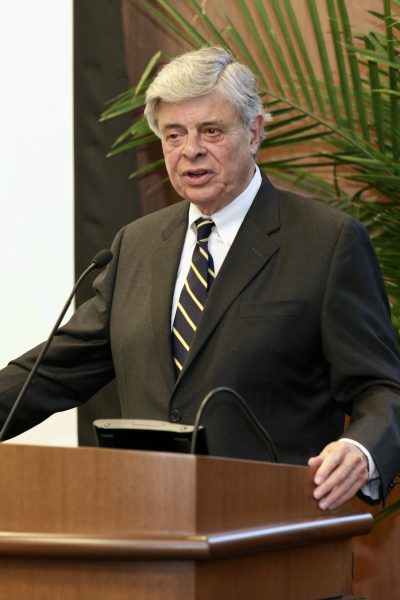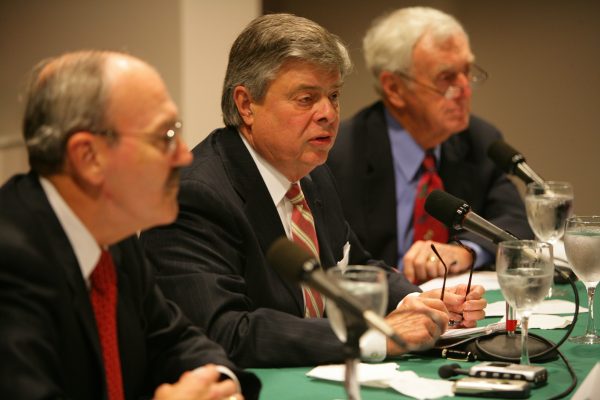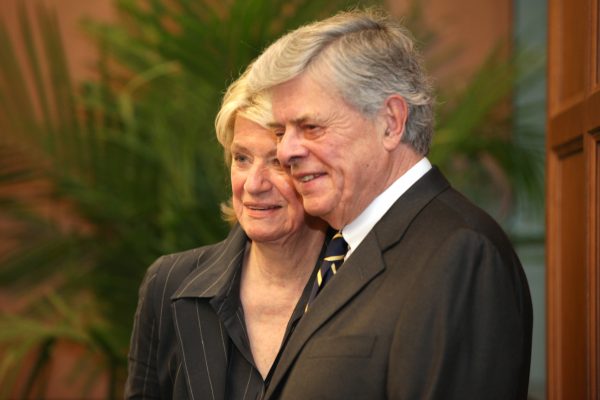
James R. Sasser, BA’58, JD’61, a former three-term U.S. senator from Tennessee and ambassador to China, died Sept. 10 in Chapel Hill, North Carolina. He was a statesman who loved Tennessee and the U.S. Senate and believed in public service; he was 87.
Sasser studied law and history at Vanderbilt, and, after graduating, he served in the U.S. Marine Corps Reserve and joined a Nashville law firm. But, as he once said, he was “bitten by the political bug” early on when he worked on political campaigns, and in 1976 he won a U.S. Senate seat. Thus began his decades-long career in public life and public service.

PUBLIC SERVICE
Sasser represented Tennessee from 1977 to 1995 in the U.S. Senate, where he championed affirmative action and foreign aid programs. He became a leader on budgetary matters and fiscal issues, chairing the Senate Budget Committee from 1989 to 1995. He worked with Presidents George H.W. Bush and Bill Clinton, and with senate colleagues from both parties, to pass fiscal reform measures that eliminated the federal deficit for the first time in a generation.

“In his distinguished career, Senator Sasser bridged divides, invited differing perspectives and understood the power in finding common ground. His leadership and service will forever stand as an example of the values Vanderbilt holds most dear and seeks to instill in its graduates,” Chancellor Daniel Diermeier said. “We are grateful to the Senator and his family for their support of Vanderbilt over the years, and we are especially honored that Jim and Mary chose Vanderbilt as the home for their personal papers.”
AMBASSADOR TO CHINA
In 1995, Sasser was appointed ambassador to China. When President Clinton first called to ask if he would be interested in an ambassadorship, Sasser recalled telling him, “I would not—unless I can be ambassador to China.” He realized the importance of establishing a working relationship with the nation that was becoming one of the most important in the world.

Sasser worked during his tenure as ambassador to improve market access and opportunities for U.S. companies, and he was instrumental in improving relations between the two countries. “The new warmth in Chinese-American relations is in part a personal victory for Mr. Sasser,” The New York Times reported in 1998. “By all accounts Mr. Sasser personified the American effort to create friendlier ties despite the deep differences over issues like human rights.”
“In an era of two-party competition when talented leaders of both parties helped Tennessee flourish, Jim Sasser was one of the most able of those leaders,” said Lamar Alexander, BA’62, a fellow former U.S. senator and onetime governor of Tennessee. “His service as party chairman, senator and ambassador to China set an admirable example for the next generation of leaders.”
When NATO mistakenly bombed the Chinese embassy in Belgrade, Serbia, in 1999, violent, anti-American protests erupted in Beijing and other cities across China. The ambassador was trapped inside the defaced U.S. embassy for four days. The violence eventually quieted, in large part because Sasser had been working to strengthen the relationship between presidents Clinton and Jiang Zemin. “President Jiang knew in his heart that President Clinton would not do that on purpose,” Sasser recalled. “We had built a relationship of mutual trust.”
After retiring as ambassador in 2001, Sasser was a visiting professor at George Washington University, then became a Washington-based business consultant to American and Chinese companies. He later taught at the University of North Carolina–Chapel Hill.
SPECIAL CONNECTIONS
Sasser was born in Memphis and grew up in Nashville. While studying at Vanderbilt, he and his wife, Mary Gorman Sasser, BA’59, met in a history class.

Vanderbilt “is where our journey began,” he said in 2013 when he and Mary chose Vanderbilt as the home for their records, which they donated as a resource for future students, scholars and researchers.
“We met as students there in the ’50s, and the education that it provided us, as undergraduates and then for me as a law student, proved to be the foundation for decades of public service—for which we are both enormously grateful.”
Sasser is survived by his wife; his son, James Gray Sasser, JD’98; his daughter, Elizabeth Sasser; four grandchildren and two sisters.



